
Faust is the protagonist of a classic German legend based on the historical Johann Georg Faust.
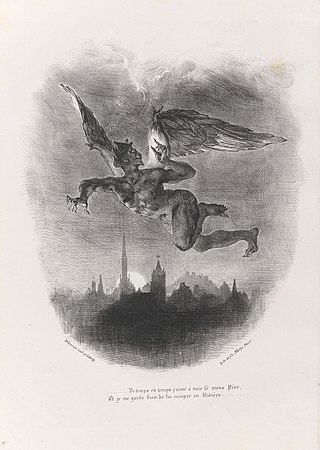
Mephistopheles, also known as Mephisto, is a demon featured in German folklore. He originally appeared in literature as the demon in the Faust legend and has since become a stock character appearing in other works of arts and popular culture.
Mephisto or Mephistopheles is one of the chief demons of German literary tradition.
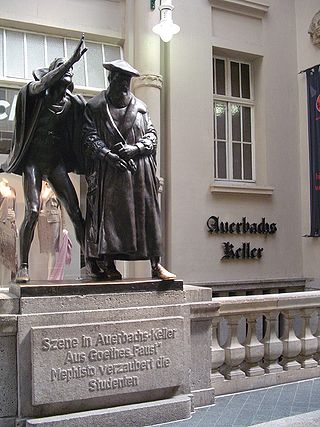
Faust is a tragic play in two parts by Johann Wolfgang von Goethe, usually known in English as Faust, Part One and Faust, Part Two. Nearly all of Part One and the majority of Part Two are written in rhymed verse. Although rarely staged in its entirety, it is the play with the largest audience numbers on German-language stages. Faust is considered by many to be Goethe's magnum opus and the greatest work of German literature.

Kamelot is an American power metal band from Tampa, Florida, formed by Thomas Youngblood in 1987. The Norwegian vocalist Roy Khan joined for the album Siége Perilous, and shared songwriting credit with Youngblood until his departure in April 2011. On June 22, 2012, Youngblood announced on their website that their new vocalist would be the Swedish singer Tommy Karevik, who was first featured on Kamelot's album Silverthorn as the main vocalist, co-songwriter, and lyricist.

Faust – A German Folktale is a 1926 silent film produced by Ufa, directed by F. W. Murnau, starring Gösta Ekman as Faust, Emil Jannings as Mephisto, Camilla Horn as Gretchen/Marguerite, Frida Richard as her mother, Wilhelm Dieterle as her brother and Yvette Guilbert as Marthe Schwerdtlein, her aunt. Murnau's film draws on older traditions of the legendary tale of Faust as well as on Goethe's classic 1808 version. Ufa wanted Ludwig Berger to direct Faust, as Murnau was engaged with Variety; Murnau pressured the producer and, backed by Jannings, eventually persuaded Erich Pommer to let him direct the film.

Roy Sætre Khantatat, commonly known as Roy Khan, is a Norwegian singer and songwriter. He is the lead singer for the progressive metal band Conception and the former lead vocalist for power metal band Kamelot from 1997 until his departure in 2011. He co-wrote most of Kamelot's songs with the band's guitarist and founder Thomas Youngblood during his tenure. Khan had retired from music in 2011 until 2018, when he released a new solo song on YouTube and announced the return of Conception.
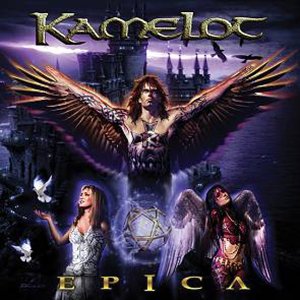
Epica is the sixth studio album by American power metal band Kamelot, released on March 3, 2003 through Noise Records. It was the first concept album by Kamelot. This album, along with its sequel The Black Halo (2005), is a rock opera inspired by the story of Goethe's Faust. Epica tells Part 1 while The Black Halo tells Part 2. Most of the lyrics were written before the actual music was composed. The album inspired the naming of the band Epica after its release.

Stian Tomt Thoresen, known professionally as Shagrath, is a Norwegian musician who is the vocalist, founding member and multi-instrumentalist of the band Dimmu Borgir.
Memento mori is a common motif in art.

Michael Rodenberg, nicknamed Miro, is a German keyboard player and record producer known for working with power metal bands such as Angra, Shaaman, Luca Turilli, Rhapsody of Fire, Kamelot, and Heavens Gate. He mainly works in conjunction with his some-time bandmate Sascha Paeth.

One Cold Winter's Night is the second live album by American power metal band Kamelot, released in 2006 on the SPV label Steamhammer in Germany. It is the second live album and first live DVD from the band, and was released on November 14, 2006. It marks the first appearance of Oliver Palotai on keyboards. The album featured guest appearances by Simone Simons while the second disc of the DVD set contained a number of interviews and videos.
Faust has inspired artistic and cultural works for over four centuries. The following lists cover various media to include items of historic interest, enduring works of high art, and recent representations in popular culture. The entries represent works that a reader has a reasonable chance of encountering rather than a complete catalog.

Ghost Opera is the eighth studio album by American power metal band Kamelot. It was released in 2007 by SPV GmbH/Steamhammer Records, on June 1 in Germany and followed by releases on June 4 in Europe and June 5 in the United States. It is the first studio album by Kamelot to feature keyboardist Oliver Palotai, and the last with bassist Glenn Barry. The album spawned four music videos for the songs "Ghost Opera", "The Human Stain", "Rule the World" and "Love You to Death".
Faust is a manga by Osamu Tezuka that was published in tankōbon form in 1950.
This article lists cultural references to Mephistopheles, the fictional devil from Faust and Doctor Faustus who has been used in other pieces of literature, film, comics and music.
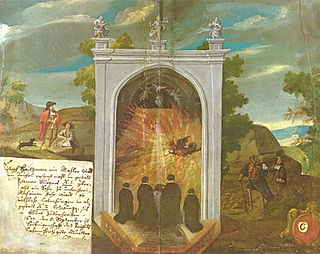
The idea of making a deal with the devil has appeared many times in works of popular culture. These pacts with the Devil can be found in many genres, including: books, music, comics, theater, movies, TV shows and games. When it comes to making a contract with the Devil, they all share the same prevailing desire, a mortal wants some worldly good for their own selfish gain, but in exchange, they must give up their soul for eternity.

Thomas Youngblood is an American metal guitarist, songwriter, and founding member of power metal band Kamelot.

Le petit Faust is an opéra bouffe in four acts which burlesques the drama Faust by Goethe and the opera of the same name by Gounod. The music of the piece is by Hervé, with a text by Hector-Jonathan Crémieux and Adolphe Jaime. The work had its premiere in Paris at the Théâtre des Folies-Dramatiques on 23 April 1869.
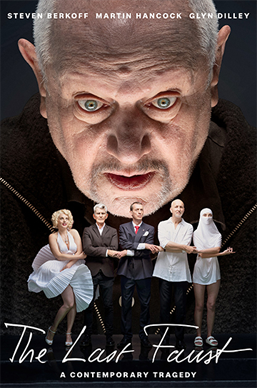
The Last Faust is a 2019 feature art film written and directed by the German artist Philipp Humm. Set in 2059, it is a contemporary interpretation of Johann Wolfgang von Goethe's 1808 Faust and the first film directly based on both parts of the tragedy. It stars English actors Steven Berkoff and, Martin Hancock (Faust). Its music is based on Richard Wagner with tracks from Swiss electronic music duo Yello.















